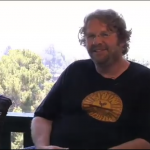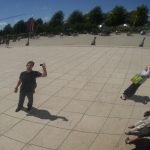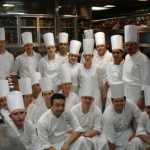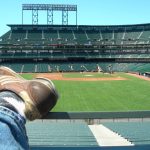How To Become a Cardiovascular Technologist
What were you doing at our age, at like 21.
I was in college. I went to college at 17 when I graduated high school. I really didn’t know much about what I was going to do. I always liked science.
My father worked at a hospital. He was the manager of a medical laboratory and a medical technologist. Did a lot of blood work and stuff like that. It always seemed to be interesting, but not all that interesting. Test tubes and machines.
So I went to college and was working at a hospital at the time. I decided I wanted to pursue med school. I wanted to start earning a living sooner than later. And when I went to Geneva College, they announced they had a program affiliated with this hospital. Fairfax Hospital. With cardiovascular technology, which is what I do. I’m a cardiovascular technologist.
It sounded like a good opportunity. It was in the medical field. There’s a lot of direct patient contact. The most interesting thing about working in a hospital is working with people. Your interactions with other doctors, physicians, nurses, and patients. That’s what really keeps it interesting.
The other thing I liked about it is, compared to a lot of things, cardiology is relatively clean. It’s not gastro where you’re touching organs and stuff like that (laughs). That’s how I got into this field. It was sort of by chance.
You were a bodybuilder.
Yeah. I was a bodybuilder for years. The last time I competed was 1994. I weighed about 230 pounds. So that was 30 pounds ago (laughs). I still work out to try to keep from falling apart. But I’m not nearly as intense as I used to be.
Actually, it was kind of bizarre. Because I was able to compete at a national level. Most of the guys that do that are gym rats. They just live in the gym and train.
It was kind of embarrassing because I was gifted. I worked full time doing my job with 50-60 hour weeks and was able to compete as a bodybuilder. On the weekends especially. I was almost embarrassed when these guys talked about what they did for a living.
‘Well what do you do?’ Uh, I work in a hospital. ‘What? What do you mean you work in a hospital?’ I work in a hospital.
There’s obviously some dedication required. I’ve never been a lifter. Zach is from time to time. But have you found that dedication is required to be a bodybuilder to get out there and do it every day. Is that dedication helped you in other places in your life?
It has. The thing that’s interesting is that I gravitate towards things. That’s where the discipline has helped me. I’ve always seemed to be inclined towards that discipline. I’m also pretty systematic. I learned early on that the key to me being faithful in training, when I was bodybuilding and still now, that it’s to make it a part of my everyday routine.
So I would always find a gym that was on my way home from work. I’d go to the gym, then go home. Because if I knew that if I went home first, I’d never get back to the gym.
I was a competitive bodybuilder from the age of 18 to 33. That was just a routine to work through those years. I went to work. When I was in college I went to my classes. From classes to the gym. From the gym to home. For years. I was consistent, and that consistency allowed me to compete successfully.
How long did you spend in the gym?
I used to train, when I was training my heaviest, I did for two hours at a time. Five days a week. Then three days a week I’d spend forty-five minutes in there on the bike to keep from spreading around the waistline.
What do you do? I want to know your title and what you do here?
By trade, I’m a cardiovascular technologist. We are basically cath lab dudes. We work with the physicians. It takes four hands at a scrub table during these catheterization procedures. Somebody manipulating the catheter, somebody injecting the coronaries with the contrast. We use this machine here to take pictures of people’s coronary arteries. We find out if they’re in jeopardy of having a heart attack. Or sometimes when they actually have a heart attack, they come down from the emergency room and they sit on the table. I shoot the pictures to see where the blockages are. Then I open them up with guidewires and put in these stents in that open up the arteries.
There’s a cardiologist involved in each of those procedures. We work along with the cardiologist and nurses. It usually only takes four or five people. A cardiologist, three or four techs and nurses.
In each procedure, the cardiologist is always doing the same thing. He’s manipulating the catheter. We help him by injecting the coronaries and by inflating the balloons to open up the coronaries.
One or two of us will put them on the table. Give them medications. In the operating room we use this machine here. It helps do the injections. We also measure the patients blood pressure and heart rate. That’s what all these things are. This is a big physiologic monitor that shows the patients heart rate and blood pressure and oxygen saturation. It shows real time as we continue through the procedure.
There’s another one of us in the back room that monitors everything back there. You control all the information that comes up on these screens. One of us in the back room and then a couple of us helping the cardiologist. That’s pretty much what we do.
That’s cool.
It’s great fun. I enjoy it. I enjoy it immensely. It’s one of the most gratifying things is when you get a call from someone in the emergency room having a heart attack and they come down here, thriving in pain and sweating profusely. Sometimes they’re gray. And they’re really uncomfortable.
Our goal is when you get someone like that, is that in thirty minutes or less, have gone down and cleared the blockage, inflate the balloon, and stop the heart attack. It’s really shocking to see a person come in like that. When we close the chest up, they stop sweating. Their color turns normal. They feel a lot better. Because often times they feel normal again. And they ask if they can leave now. People actually ask if they can leave. You have to explain to them that they just had a heart attack so they have to stay in the hospital a couple days (laughs). That’s the most fun.
That’s cool. So we are called Pursue the Passion. That’s the name of our journey. You’re passionate about what you do?
I’d say.
How would you define that word?
Passion?
Yeah. Preferably without using the words ‘fire’ or ‘desire.’
I think being passionate about what you do is being excited about the opportunities you have every day. I think the best part about what we do here is that you can see immediate impact. Especially with those people who are having a heart attack. They come in sick. We relieve their coronary. Thirty minutes later they’re better. They’re going to live happily ever after. Granny’s out there in the lobby going ‘Thank you! Thank you!’ You really get the sense that you made a big difference for someone. That will make you passionate about what you do. There’s nothing better when you give someone back to their family. That’s the best part about what we do here.
If you had a single piece of advice to give to yourself, at 22, what would it be?
Wow! That’s so long ago! (laughs)
I know. It’s a super loaded question. Everyone hates.
That is a darn good question. That’s one of those questions that if you could do things all over again, what would you do differently.
Oh yeah.
One of the things I would do, if I knew then what I know now, I would have been a lot more confident in my abilities to accomplish things. I never took myself really seriously. I still don’t in a lot of ways. Especially when I was 22 years old. I just had no idea about the things I would be able to accomplish. Maybe that was a good thing. If I worried too much about this type of thing it would scare me.
I can remember when I first started in this field and my preceptor who was assigned to show me how to do my job showed me the very simplest of tasks. I remember just being terrified thinking I’ll never be able to do this. The moral of the story is you definitely can. Find something that looks like fun to do, and pursue it with passion (laughs). It’s amazing how things can work out for you.
So did you do undergrad and then a grad program for this?
No actually, when I went through this program, it was part of the graduate degree I got. I got a BS degree. And working here served as my fourth year of college. I think they might have changed it. They’re going to make it a master’s program?
What would you have a masters in?
Masters in hospital science? I’m not sure what it is. It’s still being developed by the people at Geneva college who run the school.
I was really interested in this interview only because we haven’t talked to any doctors, and I don’t particularly want to, but it’s interesting to talk to people who are in the medical field, doing things actively who were not medical school kids. Who have not been practicing medicine for a long time but have still found a way to get themselves practicing medicine. I don’t think many people realize that there’s options to do that.
A lot of people haven’t heard of what we do. People come in and they’re like, ‘What are you guys? Nurses?’
Well you think about surgery, and you think it’s one, old white guy, alone, cutting open someone’s chest. It’s like no, dude. There’s like, forty people in the room. There’s a lot of people involved.
Lot of people with titles and job descriptions that people really don’t know much about. Once you get into the hospital and into the health profession, you get to know people. You have a PA, or an occupational therapist, those professions are getting more into the mainstream. I have a buddy who is an SA, a surgical assistant. He’s actually out in Phoenix, Arizona.
That’s funny. I actually have an ex girlfriend who is a surgical assistant in Phoenix, Arizona.
Really? Well my friend, he’s hired a couple physicians on staff. And with that, he’s been able to bill for things he couldn’t bill for otherwise. He’s really resourceful. He didn’t go to med school. He’s built a multimillion dollar enterprise. It’s mind boggling.






